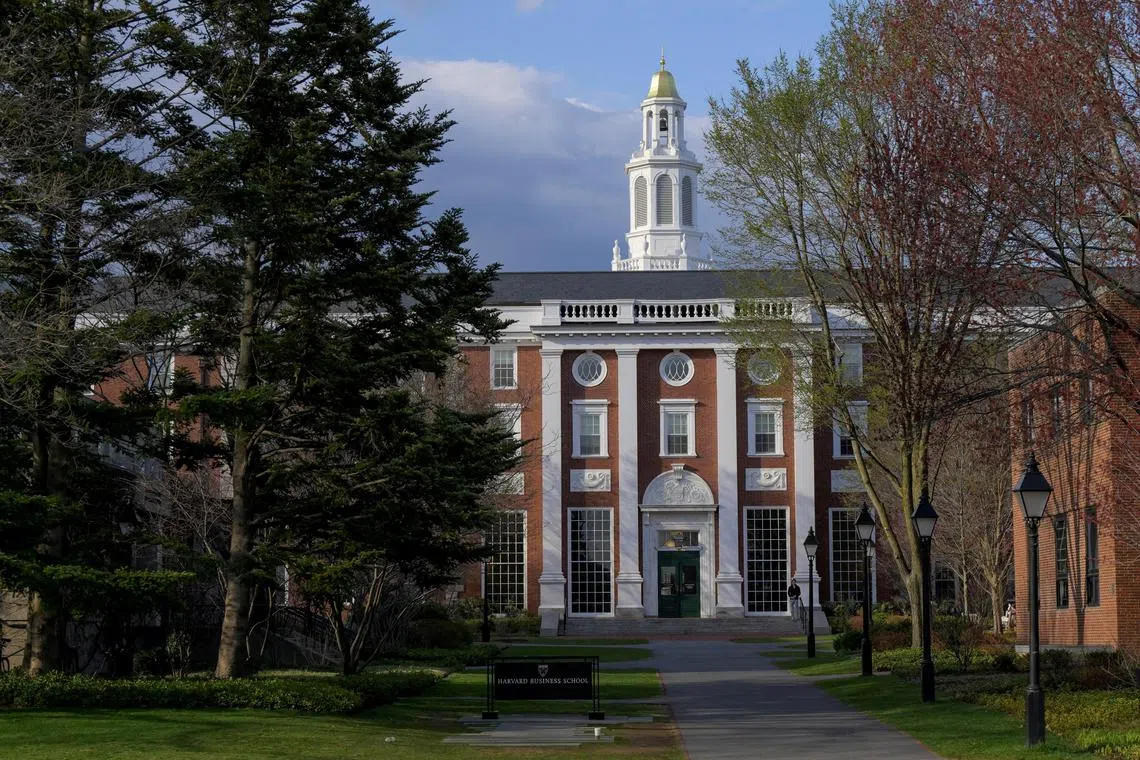Trump slams Harvard as ‘a liberal mess’ as funding fight heads to court
Sign up now: Get ST's newsletters delivered to your inbox

The Trump administration has threatened several top-tier US universities, including Harvard (above), prompting concerns over declining academic freedom.
PHOTO: REUTERS
Follow topic:
WASHINGTON - US President Donald Trump on April 24 bashed Harvard as an “anti-Semitic, far-left institution”, as the university battles his administration’s funding freeze in court.
The latest outburst from the US leader comes as his administration cracks down on American universities on several fronts, alleging widespread anti-Semitism, anti-white bias and the promotion of “gender ideology” by protecting trans students.
The administration has threatened several top-tier universities with funding freezes and other punishments, prompting concerns over declining academic freedom.
It has also moved to revoke visas and deport foreign students involved in the protests, accusing them of supporting Palestinian militant group Hamas, whose Oct 7, 2023, attack on Israel sparked the Gaza war.
Harvard, which has seen billions in federal funding frozen
“The place is a liberal mess,” Mr Trump wrote on his Truth Social platform, also complaining that the university has admitted students “from all over the World that want to rip our Country apart”.
His broadside came a day after he issued an executive order targeting higher education
The executive order seeks to clamp down on what Mr Trump brands “unlawful discrimination” – that is any measures that seek to promote the representation of “racial and ethnic minority individuals”.
On April 24, a federal judge ruled that Mr Trump could not withhold funds from public schools that operate equality and diversity policies, which have been a particular target of the President.
The ruling issued in New Hampshire does not apply across the board, but instead to the largest US teacher union, the National Education Association (NEA); and the Centre for Black Educator Development (CBED) non-profit, which promotes the recruitment of Black teachers.
The ruling will apply in schools employing members of the NEA, or contracting with the CBED.
Anti-Semitism claims
Mr Trump and his White House team have publicly justified their campaign against universities as a reaction to what they say is uncontrolled anti-Semitism and a need to reverse diversity programmes aimed at addressing historical oppression of minorities.
The administration claims that protests against Israel’s war in Gaza
On April 24, several Jewish lawmakers accused Mr Trump of weaponising anti-Semitism to attack universities for his own ends.
“We reject any policies or actions that foment or take advantage of anti-Semitism and pit communities against one another; and we unequivocally condemn the exploitation of our community’s real concerns about anti-Semitism to undermine democratic norms and rights,” the Democratic senators, including Minority Leader Chuck Schumer, wrote in a joint letter.
Many US universities, including Harvard, cracked down on the protests over the allegations at the time, with the Cambridge-based institution placing 23 students on probation and denying degrees to 12 others, according to protest organisers.
Mr Trump’s claims about diversity tap longstanding conservative complaints that US university campuses are too liberal, shutting out right-wing voices and favouring minorities.
In the case of Harvard, the White House is seeking unprecedented levels of government control over the inner workings of the country’s oldest and wealthiest university – and one of the most respected educational and research institutions in the world.
Professor Kirsten Weld, president of the Harvard chapter of the American Association of University Professors, told AFP: “This is an increasingly autocratic, authoritarian government that is trying to dismantle not just our universities, but the higher education sector as a whole.”
Sale of US$1 billion of private equity stakes
Harvard’s endowment is in advanced talks to sell about US$1 billion (S$1.3 billion) of private equity fund stakes, reported Bloomberg. This comes at a time when the school faces financial uncertainty, compounded by pressure from Mr Trump’s threats and a sluggish market for returns on illiquid assets.
Harvard Management, which runs the largest fund in US higher education, is working with Jefferies Financial Group to offload the portfolio to Lexington Partners in a so-called secondaries transaction, according to people with knowledge of the matter.
Harvard has allocated almost 40 per cent of its US$53 billion endowment to private equity, according to an annual report for the year ended in June. Along with other universities, the school is facing pressure because investment firms are finding it difficult to sell companies and return money to their limited partners. Delayed investment returns have pressured liquidity at endowments, pensions and family offices – forcing many to rely on the performance of their public stocks and bonds to meet immediate cash needs or seek secondary sales.
The effort to sell the secondaries portfolio began in 2024, according to people familiar with the situation. That was before Mr Trump’s announcement of market-roiling tariffs and his heightened conflict with elite universities, including Harvard, Princeton, Columbia Cornell and Northwestern
Earlier in April, the Trump administration halted US$2.2 billion of multi-year grants to Harvard. Harvard then sued the government after refusing to bow to the administration’s demands for changes, which they characterised as threatening its independence and going far beyond the issue of tackling anti-Semitism.
Responding to Harvard’s defiance, the President suggested the Internal Revenue Service should tax the university as a “political entity”, a move that would hurt the school’s finances and make it harder to raise money from donors.
In reaction to pressure from the government, the school had announced a hiring freeze in March and sold US$750 million of bonds in April. AFP, BLOOMBERG

